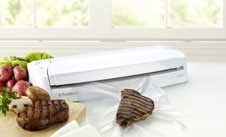 My newest experiment has been vacuum sealing my food. As one who always loved to "put up" food in glass Mason jars and keep a stocked freezer, the thought of further food preservation intrigued me. Vacuum sealing is a simple way of preserving food. If airborne bacteria can't get to the food, the process of natural breakdown (spoilage) can be avoided. It's the way food is packaged for shipping, so why not try it at home? I'm still on the fence as to whether or not it is saving me money, but I certainly am having fun learning.
My newest experiment has been vacuum sealing my food. As one who always loved to "put up" food in glass Mason jars and keep a stocked freezer, the thought of further food preservation intrigued me. Vacuum sealing is a simple way of preserving food. If airborne bacteria can't get to the food, the process of natural breakdown (spoilage) can be avoided. It's the way food is packaged for shipping, so why not try it at home? I'm still on the fence as to whether or not it is saving me money, but I certainly am having fun learning.
By packaging a head of lettuce, which is pricey in my area of the country during the winter, in a vacuum canister I can preserve it for more than two weeks. All the while it looks as green as the day I brought it home.
I've even sealed leftover steak rolls in a canister and used them eight days later without noticing a difference in their freshness.
Here are the questions asked by community members. Read on to see the answers provided by the ThriftyFun community.
After you vacuum seal your vegetables, do you have to freeze them?
By Bill
You probably already know that some vegetables, such as lettuce, should not be frozen. Cooked veggies can be refrigerated if they are consumed within 3 or 4 days. If you freeze veggies, they should be prepared in a certain way, depending on the veggie. Here is a link to a freezing guide for vegetables.
I am vacuum sealingdried foods, ie. beans, sugar, dried soup, dried milk, etc. and storing them in my pantry. We close the house down in Canada for the winter and my dried foods undergo a freezing and thawing process before we return back in early spring. I need to know if this dried food that is vacuum sealed is safe to consume after repeated thaws.
As long as all the air is out, it should last a long time, regardless of weather conditions
I have not tried this for two main reasons:
1. bacteria can still grow in vacuum sealed products and since I got sick on a home canned item once I shy away from all home "processed" foods.
2. all of these home preservation methods do best with consistent temperatures so even if you have done everything right, the changes in temperatures can affect bacteria and get it to start and stop growing.
I do freeze sugar and flour all the time (not vac sealed, just stored in sealed containers) and it lasts for a long time, but I have never tried this with beans or dried soups/milks. Are you leaving electricity on when you shut down your place and can freeze things?
This is just me and my habits. You can contact your Canadian Ministry of Agriculture, Food and Rural Affairs and ask what they think:
www.omafra.gov.on.ca/
Post back what you learn!
This is a tough question because it is dealing with food safety and should be answered by someone well qualified to answer.
That said; Everything that I have read states to keep food at same/constant/controlled temperature.
Since it appears you are talking about all dry food (not fresh) it may be safe to go through the freezing and thawing but only an expert can affirm that.
Do you keep refrigeration/freezer running during this away time? If so, you may be able to store these in your refrigerator.
I did read where someone stored their food in a chest type freezer until needed and thawed in refrigerator.
You can ask your Canadian source for help or ask your question on this International forum.
www.chicagotribune.com/
Here is another site to ask questions:
General Information..
www.chicagotribune.com/
I have been using my Foodsaver for the last 10 yrs and wore out 2. My family has never gotten sick. i freeze meat, vegetable and re-seal chips, cereal, cookie and more. During the hurricane I seal important papers. I put dry food in mason jars and take the air out with the food save attachment. I put romaine lettuce in mason jars and take the air out and take to work for lunch. Love my Foodsaver